Jason Micheli's Blog, page 45
April 17, 2024
An Aural Army
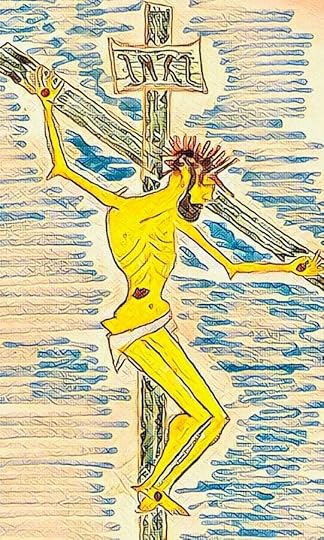
Tamed Cynic is a reader-supported publication. If you appreciate the work, pay it forward by becoming a paid subscriber!
(image: Christ Alone by Chris EW Green)
The lectionary Gospel passage for the Fourth Sunday of Easter is from John 10.11-18:
"I am the good shepherd. The good shepherd lays down his life for the sheep. The hired hand, who is not the shepherd and does not own the sheep, sees the wolf coming and leaves the sheep and runs away--and the wolf snatches them and scatters them. The hired hand runs away because a hired hand does not care for the sheep.
I am the good shepherd. I know my own and my own know me, just as the Father knows me and I know the Father. And I lay down my life for the sheep. I have other sheep that do not belong to this fold. I must bring them also, and they will listen to my voice. So there will be one flock, one shepherd. For this reason the Father loves me, because I lay down my life in order to take it up again. No one takes it from me, but I lay it down of my own accord. I have power to lay it down, and I have power to take it up again. I have received this command from my Father."
A little over a century and a half before the birth of Christ, Israel was riven by a bitter, partisan divide that put them on the brink of civil war.
On one side of the conflict were the traditionalists, conservatives allied with Ptolemy, the Pharaoh of Egypt.
On the other side of the fight were the Tobiads— progressives— those Jews who sought to synthesize their covenant customs with the practices and views of the wider pagan world.
The traditionalists ousted the Tobiads from Jerusalem in 170 BC and the Tobiads found exile in Syria under King Antioches Epiphanes. No soon had they arrived in Syria the exiles began lobbying Antioches to invade Israel and restore their party to the power and authority that had been stolen from them. Those who ginned up the incursion got more than they anticipated. At the leader’s incitement, the Temple was stormed and looted. The proceedings in the Temple were halted. The chief priests at work there were hunted and beaten and killed.
As the ancient Jewish historian, Josephus, writes in the Jewish War:
“The king being thereto disposed beforehand, complied with the Tobiads, and came upon the Jews with a great army, and took their city by force, and slew a great multitude of those that favored Ptolemy, and sent out his soldiers to plunder them without mercy. He also spoiled the temple, and put a stop to the constant practice of offering a daily sacrifice of expiation for three years and six months.”
In the aftermath of the violence, Antioches erected an altar to Zeus inside the Temple where the ark of the covenant had once resided. He banned the sign of the covenant, circumcision, and, in the holy of holies— where only the great high priest was clean enough to come— Antioches slaughtered a herd of pigs and smeared their entrails and blood upon the mercy seat.
The breach of the Temple crossed a line.
And it ignited a large scale revolt led by Mattathias, a Jewish priest, and his five sons Jochanan, Simeon, Eleazar, Jonathan, and Judah. A year after the desecration of the Temple, Judah Maccabeus took the mantle from his father, becoming a guerrilla leader, earning the nickname “Judah the Sledgehammer,” and winning the title מָשִׁיחַ.
Messiah.
When his father commissioned him to lead the movement, Judah pledged to “avenge the wrong done by our enemies and to pay back to the Gentiles what they deserve.”Judah the Sledgehammer kept his vow, defeating Antioches two years later and deposing the seditionists.
Upon victory, jubilant Israelites showered Judah the Sledgehammer with shouts of “Hosanna!”
And they rejoiced that perhaps the Sledgehammer was the Shepherd, the Good Shepherd, the Messiah of Messiahs, prophesied by Ezekiel.
As it turned out, no.
After defeating Antioches Epiphanes, Judah turned around and signed a treaty with Rome. The Sledgehammer suffered a failure of imagination and traded one kingdom for another just like it.
But not before Judah became the prototype for the kind of Messiah Israel expected.Upon his victory over Antioches, over eight days and eight nights, Judah the Sledgehammer cleansed the Temple, turning over the tables of the pagan altars, and instituted a festival to commemorate the Temple’s restoration. Hanukkah.
Or, as the Gospel of John puts it in Sunday’s text (as a FLASHING RED LIGHTBULB CLUE of you, dear reader), the Festival of Dedication.
April 15, 2024
There is Salvation in No One Else
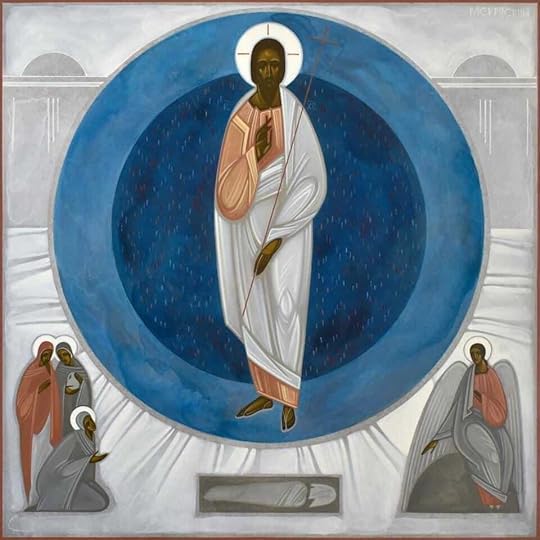
Tamed Cynic is a reader-supported publication. If you appreciate the work, pay it forward by becoming a paid subscriber!
Acts 4.5-12
The assigned Old Testament(?!) lectionary passage for the Fourth Sunday of Easter is from Luke’s Book of Acts:
The next day their rulers, elders, and scribes assembled in Jerusalem, with Annas the high priest, Caiaphas, John, and Alexander, and all who were of the high-priestly family. When they had made the prisoners stand in their midst, they inquired, "By what power or by what name did you do this?" Then Peter, filled with the Holy Spirit, said to them, "Rulers of the people and elders, if we are questioned today because of a good deed done to someone who was sick and are asked how this man has been healed, let it be known to all of you, and to all the people of Israel, that this man is standing before you in good health by the name of Jesus Christ of Nazareth, whom you crucified, whom God raised from the dead. This Jesus is 'the stone that was rejected by you, the builders; it has become the cornerstone.' There is salvation in no one else, for there is no other name under heaven given among mortals by which we must be saved."
John Wesley said an Almost Christian is someone who believes the scriptures and creeds of the faith are true, someone who generally loves God and serves their neighbor while an Altogether Christian, Wesley says, possesses “sure trust and confidence” in God’s saving love for them “through the merits of Jesus Christ.”
According to Peter— or rather, according to the deus dixit, the word the Holy Spirit places on Peter’s lips— the grace of God, the entire remission of your sins and the reckoning of Christ’s perfect righteousness as your own personal possession to take before a Holy God, salvation is not a possibility for which we hope. Salvation is an assurance to which we cling.
Salvation is not an outcome about which we speculate.Salvation is a certainty we anticipate.When it comes to the matter of God saving sinners— in their sins— it’s not a maybe.April 14, 2024
Easter's Afterwards

Tamed Cynic is a reader-supported publication. If you appreciate the work, pay it forward by becoming a paid subscriber!
Colossians 4.2-6
On the Monday before we kill him, some Sadducees corner Jesus at the Temple. After the Pharisees attempt to entrap him with a question about paying taxes to Caesar, the Sadducees try to expose Jesus to ridicule by asking a question aimed at the absurdity of one of the items of his faith, resurrection:
“Teacher, Moses taught, ‘If a man dies having no children, his brother must marry the widow and raise up offspring for his brother.’ Now there were seven brothers among us. The first married and died, and having no offspring left his wife to his brother. So too the second and third, down to the seventh. After them all, the woman died. In the resurrection, therefore, of the seven, whose wife will she be? For they all had her.”
Jesus rebuffs the premise of their question, “You know neither the Scriptures nor the power of God.”
The Sadducees were a sect set apart in Israel in two ways.
First, they were the party charged with the maintenance of Temple. So when Mary’s boy throws his temple tantrum the day before, he threatens not simply their piety but their livelihood.
Second, the Sadducees were distinct in the tapestry of Israel’s religious life for rejecting the hope of the resurrection of the dead. That the Sadducees were peculiar among God’s people for not believing in the resurrection of the dead is but a reminder that the resurrection of the dead is a Jewish belief.
Resurrection is not a Christian belief. Resurrection is a Jewish belief.Resurrection is first an item of the faith of Jesus the Jew before it is a claim about the faithfulness of Jesus the Christ. This is important to remember because the resurrection that the Father in fact works at Easter is not the resurrection that the Son had prophesied to Israel, and the difference makes all the difference.
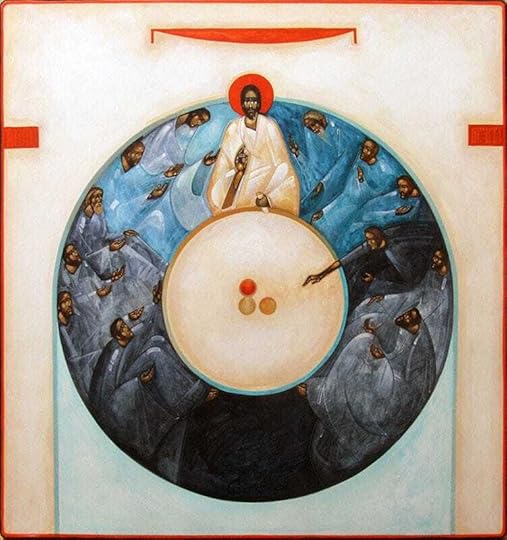
The primary passage in the Hebrew Bible which anticipates the resurrection is in the Book of Daniel, chapter 12. However, the resurrection revealed to the prophet Daniel is both a general resurrection, the resurrection of all rather than a single Israelite, and the resurrection revealed to the prophet was to be a double resurrection, for some a resurrection into the kingdom and for others a resurrection into contempt.
Daniel relays the promise accordingly:
“And many of those who sleep in the dust of the earth shall awake, some to everlasting life, and some to shame and everlasting contempt.”
“The same day,” Matthew writes in his Gospel, "Sadducees came up to him, who say that there is no resurrection, and they asked Jesus a question [about the resurrection].” The Sadducees did not believe in the resurrection like their fellow Jews so believed; however, the Sadducees’s fellow Jews anticipated a resurrection that would be general and double— that is, the resurrection hope was for a resurrection that would be cosmic in scope and conclusive in its stretch, signaling both judgment and redemption.
When God raised the dead, Israel hoped, the work would be universal, encompassing all— every creature under the banner of heaven— and it would be final, the Lord’s last culminating “Let there be…”
In other words, by the Old Testament’s own witness, the first moment of the Risen Jesus’s life should have marked the end of history, with judgment for sinners and justice for the sinned against. The Father should have raised Jesus into the first day of the Last Future not into the third day of this world. As soon as the angel announces to Mary, “He is not here, for he has risen” immediately, right then and there, “every knee should bend and every tongue should confess that Jesus Christ is Lord.” Once Jesus lives with death behind him, Death itself should be no more, “mourning and crying and pain should be no more."
Easter should have been simultaneously the irruption of the end-with-a-capital-E.On the basis of scripture alone, “there was no real need for this afterwards.” Easter’s afterwards.

Alfred Loisy was a French Catholic biblical scholar in the late nineteenth century. A modernist, Loisy’s revisionist interpretations of scripture and his rejection of the creedal tradition led to his excommunication in 1908.
With biting irony, Loisy once mocked the faith by saying:
“Jesus came announcing the kingdom, but instead it was the church which came.”Loisy may have been a heretic but on the matter of Easter’s afterwards he is in surprising agreement with St. Luke. In the Gospel of Luke, at his last resurrection appearance, the disciples ask the Risen Jesus, “Lord, is this the time when you restore the kingdom to Israel?” Jesus avoids the question. Jesus does not dismiss the question. He dodges the question. And in place of any answer at all, Jesus promises the gift of the Holy Spirit as the power for the church’s vocation.
In other words, there is and there will be a kingdom.
Just not yet.
The surprise of Easter is not simply that the tomb is empty.The surprise of Easter is that Easter is not the End.This is why all four Gospels agree that the first response to the news that Jesus has been raised from the dead is fear. If you believed the apocalypse was now, your sphincters would tighten up too.
Easter is not the end of time— that’s the surprise.
Easter is a meantime.
To wit—
What God does with the dead Jesus is also at once a not doing.
What God does with the dead Jesus is also at once a not doing.
God does not do what what linear-thinking readers of the prophets expected. In raising Jesus from the dead but raising no other, God does not let Jesus’s resurrection be itself the End. What God does with the dead Jesus is simultaneously a not doing. God does not let Christ’s finished work be final.
As Karl Barth writes:
“It might have been quite different. The time which is our time might not have been at all.”
Why does Easter have this afterwards? According to scripture, Christ’s first coming should have been his only and his last coming.
Why the meantime?
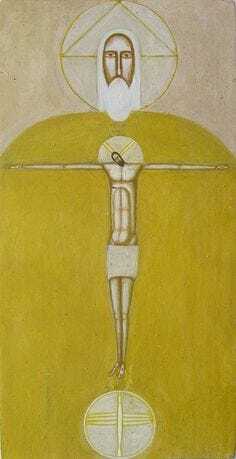
When I was a graduate student, I attended a series of lectures the theologian Robert Jenson delivered for undergraduates and faculty members. Though the attendees recognized that Jenson was one of the most brilliant theologians America has ever produced, not every one in the lecture hall was open or hospitable to the claims of Christianity.
Some listeners, though curious, were openly hostile to the gospel.
With a simplicity that hid the depth of his thought, Jenson explained how the entirety of Christian faith is an elaboration on the briefest of messages; namely, that the crucified Jesus lives with death behind him. However, one skeptical student in the lecture hall was undeterred by Jenson’s arguments and persisted in trying to poke holes in his logic:
“Wasn’t the resurrection supposed to signal the conclusion to God’s history? Doesn’t the New Testament indicate that the world was about to end? Didn’t Paul and the apostles expect Christ to return in their lifetimes? Didn’t Jesus even suggest the apocalypse was imminent? Why has God delayed? Aren’t those difficult questions for Christians to acknowledge? Does the church have an answer to those questions?”
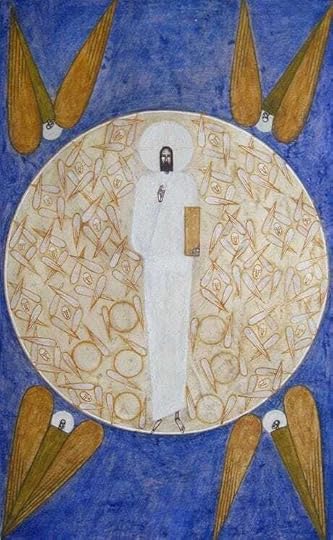
The New Testament does not order the apostle Paul’s thirteen epistles according to chronology. Instead the ancient church intentionally arranged Paul’s letters from the longest to the shortest, concluding with Philemon, which is only twenty-five verses in total. The canonical ordering not only ensconces Romans as the interpretive matrix for the rest of Paul’s correspondence, it also allows for his prison letters to be grouped together as a sequential unit, Ephesians, Philippians, Colossians— all letters from jail.
From a prison in Rome, Paul writes to the church at Colossae— a small, insignificant city in Asia Minor. Paul had never visited the church in Colossae; he writes to them because his apprentice Epaphras asked him to do so. After Paul had delivered the gospel to Epaphras, Epaphras had brought the gospel to the Colossians. Like the church at Rome, Paul did not plant the church at Colossae and he knew them not. Moreover, he knew of their struggles only secondhand. Nonetheless, Paul’s letter to the Colossians is not about their challenges as a congregation so much as it is about the elderly Paul, nearing the end of his life, reflecting upon his apostolic office and, in turn, reflecting upon the Colossians’s own calling.
Though he is bound in chains, the apostle marvels at how the word of God is nevertheless unfettered. Just so, Paul entreats the Colossians to pray that the Lord would open a door— even in prison; so that, Paul might have the opportunity to “declare the mystery of Christ.” What Paul requests in prayer from them is what Paul has prayed for them; namely, that God would open doors and equip them to proclaim the mystery of Christ. Verses two through four in the passage are all one sentence in Greek. It’s all one controlling thought; that is, prayer and watchfulness and thanksgiving are all necessary components of the message that seeks open doors.
“Pray for our work that is our message that is the mystery of Christ.”In his epistles, the mystery of Christ (mysterion tou Christou) refers not to Jesus’s two natures, fully human yet fully divine. The mystery of Christ is not that he was created ex nihilo in Mary’s womb. In Paul’s letters, the mystery of Christ does not mean that Jesus bore our sins his body on the tree nor does it point to the empty tomb. For Paul, the mystery is not even that having unveiled himself completely to dwell among us in the flesh God nevertheless remained hidden from us.
For Paul, mysterion tou Christou refers specifically to the fact that God wields the word of the cross— through his risen body, the church— to address those outside of the covenant. The mystery of Christ is the oddity that God uses the message of Christ and him crucified to include in his covenant the wider world beyond Israel. As N.T. Wright comments on the passage, the mystery of Christ “is the secret plan of God for the salvation of the whole world as this has now been made known in and through Jesus Christ.” Or as Paul puts it at the top of his argument to the Romans, “For I am not ashamed of the gospel, for it is the power of God for salvation to everyone who believes, to the religious first and also to the irreligious.”
“The mystery of Christ “is the secret plan of God for the salvation of the whole world as this has now been made known in and through Jesus Christ.”
The mystery of Christ is the secret, known only by faith, that our odd God uses— is using— this message of cross and resurrection to the end that all shall be saved.

“Wasn’t the resurrection supposed to signal the conclusion to God’s history? Why has God delayed? Does the church have an answer to those questions?”
I turned my gaze from the argumentative undergrad to the white-haired theologian. Robert Jenson revealed the slightest crease of a smile, and finally he responded nonchalantly to the skeptic’s question with a brilliant six word reply.
“Why has God waited?
His answer:
1) Because
2) He
3) Wants
4) To
5) Include
6) You
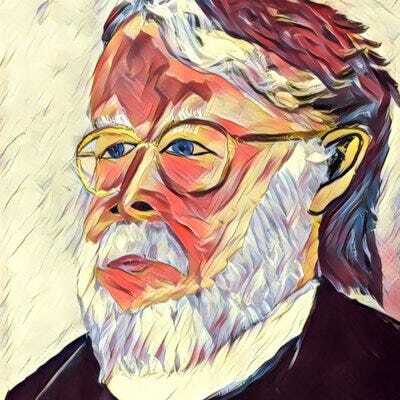
Nicholas Ayo is a Roman Catholic priest at Notre Dame who has translated a number of the sermons preached by the great scholastic theologian Thomas Aquinas. In his editorial remarks on the sermons, Ayo expresses astonishment at how the problem of unbaptized children and unbelieving adults bedeviled Christians in the Middle Ages. Aquinas was no exception to this puzzlement. Figuratively throwing up his hands, Ayo writes, “The Middle Ages simply did not know what to do with the unbeliever.”
Ayo then critiques the limitations of Aquinas’s preaching with an apparently offhand but seismically suggestive comment. He writes that Thomas’s logic did not take sufficient account of “the infinite resourcefulness of the God who wishes to save everyone.”
“The infinite resourcefulness of the God who wishes to save everyone.”
The surprise of Easter is not simply that the tomb is empty. The surprise of Easter is that Easter is not the End.
There is no real need for Easter’s afterwards.After all, the life history of Jesus Christ in his obedience unto death— even death on a cross— just is the reconciliation of God to world and of the world to God.
It is finished.
It is perfected.
It is completed.
Its accomplishment as such awaits no application. Its potency awaits no actualization. Its singularity awaits no development. All sinful resistance to grace has been unalterably undone, defeated. He who actualized our reconciliation in his death also attests to our reconciliation in his life beyond death.
He who was shut up in his tomb with our sinfulness has burst forth in the garden with our righteousness.Thus, nothing in all of creation can ever now separate us from the love of God in Christ Jesus our Lord.
There is therefore now nothing else for God to do except include you.
Karl Barth calls this meantime of Easter’s afterwards “the Time of the Community.”
Barth writes:
“The church is the community of the God who wills that all shall be saved and come to a knowledge of the truth. It has its faith and, knowing in faith for all others, it knows what it has to say to all others…all time might have terminated then [on Easter Day]. But this did not happen. It is better not to say that time continued, but rather than a further time, a new time commenced…Easter time…
Let us imagine for a moment that there were no such end-time. In that case, God would not have caused any new and further time to begin. He would have wound up all time and the existence of heaven and earth and everything within them and begun the eternal Sabbath…But this means that He would not have expected any further human response to what He accomplished and revealed in Jesus Christ…in this case, the reconciliation of the world with Him would have been a unilateral decision and exercise of force, the revelation of it a dictatorial declaration of will, and the whole a sovereign overpowering of humanity to His glory…
Easter’s afterwards is evidence that He did not do something supreme and final which renders quite superfluous any correspondence on the part of man…What is the purpose of this new and further time after the reconciliation of the world with God?
Its purpose is obviously this— that God will now allow His last word to be fully spoken or the consummation determined and accomplished and proclaimed by Him to take place in its final form until He has first heard a human response to it, a human Yes; until His grace has found its correspondence in a voice of human thanks from the depths of the world reconciled with Himself; until here and now, before the dawning of his eternal Sabbath, He has received praised from the heart of His human creation.
That is the greatness of His grace. That is the reach of His condescension. That is the seriousness of the solidarity to which He has committed Himself with us men in the person of His Son. He does not will to be without man, to have become his Reconciler and to become his Redeemer over the head of man. He wills a body for his Son. He wills open eyes and ears for what took place in His death…He wills human hearts which see this turning, and human tongues which confess it.
He wills not only that the justification which has taken place in Jesus Christ should have taken place, but that that the news of it should be sounded out and should meet with faith. In order that this may happen, He gives the world still more time.
In other words, rather than bring the kingdom, God sends the church. Which means, you are a part of the infinite resourcefulness of the God who wishes to save everyone. The love that is God longs to be loved in return. He wants his Yes to us in Jesus Christ to be reciprocated with a Yes from all to Jesus Christ. He wants all the earth to add their alleluias to his Easter work. And our odd God has the notion to get those alleluias through you. You who are his Son’s risen body. Through the doors he opens in front of you.
Quite simply—
You are the reason there is still time.

“Wasn’t the resurrection supposed to signal the conclusion to God’s history? Why has God delayed? Does the church have an answer to those questions?”
Robert Jenson gave his six word reply, itself a distillation of what Paul calls the mystery of Christ, “Because he wants to include you.”
I sat in the lecture hall and saw the argumentative undergrad furtively raise his hand to rebut the theologian, but Jenson smiled again and quickly said, “And so, you see, the answer to the question of God’s delay is also the answer to your last question. The church not only has an answer to the question of God’s delay the church is God’s answer to the question.”
When I was a student in seminary, I juggled a number jobs and side-hustles to pay the bills including a gig at the campus mailroom. One of my tasks every afternoon was to deliver the mail to the off-campus offices and buildings. The day after I attended Robert Jenson’s lecture I delivered mail to him at the Center for Theological Inquiry.
His bundle was rolled up with thick rubber bands. Knocking, I handed it to him. Usually, I was nervous in his presence and did not linger. But I gave him his mail. He said thank you. I said you’re welcome. And then I stood there, looming at his desk.
He looked up at me and I saw the same slight smile break across his face.
“I attended your lecture yesterday,” I said.
“Indeed,” he said.
“Because he wants to include you,” I repeated his reply, “Are you suggesting that, in the End, all will be saved?”
He smiled again.
“Sometimes I catch myself thinking I’m a universalist…” and his voice trailed off and he chuckled to himself, “You’re a Christian, I take it?”
I nodded.
“Well then, my boy, rather than speculate about what God will do ultimately one day in the future, why don’t you do something about what we know God, in fact, has done? We know God desires to save all and we know he has allotted precisely this time for believers like yourself to do it. So, rather than sit in lectures and posit speculative questions that put all the burden on God, why don’t you go and do the work God has given you to do?”
I stood mute.
“Go,” he said smiling and made the sign of the cross.
“Go and gospel another person. Add someone, anyone, to that all we know the Lord desires.”
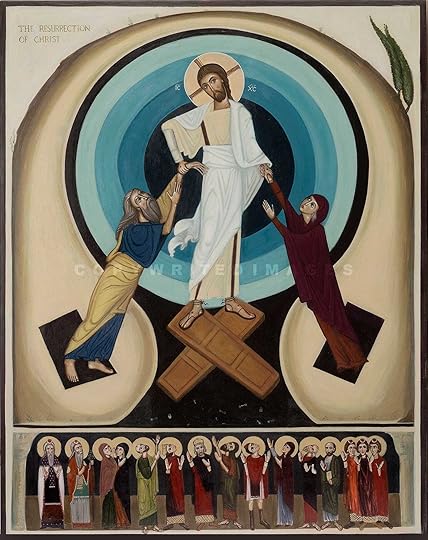
Come to the Table.
Feed on Jesus by faith.
Because, literally, the only reason we are here is for you to give him to an other.
 Get more from Jason Micheli in the Substack appAvailable for iOS and AndroidGet the app
Get more from Jason Micheli in the Substack appAvailable for iOS and AndroidGet the app
April 13, 2024
Learning the Creed with Karl Barth

Tamed Cynic is a reader-supported publication. If you appreciate the work, pay it forward by becoming a paid subscriber!
From the vault, here is the fourth session in which the Minion and I discuss Karl Barth’s lectures on the creed, Dogmatics in Outline.
April 12, 2024
Scripture's Scarlet Thread
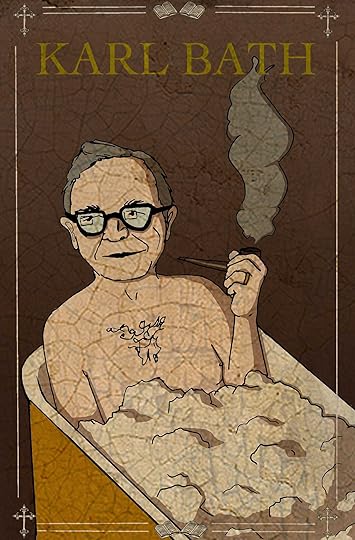
Tamed Cynic is a reader-supported publication. If you appreciate the work, pay it forward by becoming a paid subscriber!
I have been rereading volume IV.1 of Karl Barth’s Church Dogmatics. At the end of §61 (“The Justification of Man”), Barth concludes with a citation from the Heidelberg Catechism. The theologian judges the Heidelberg Catechism to stand alone in capturing the “insight and confession of all the Reformation Churches of the 16th century.
Barth writes:
“The strength of the Reformation exposition of righteousness by faith alone consisted in a word in this, that it saw and made plain that the living Jesus Christ— and His righteousness as man’s righteousness— is the scarlet thread which runs through Galatians and therefore the rest of Holy Scripture.”
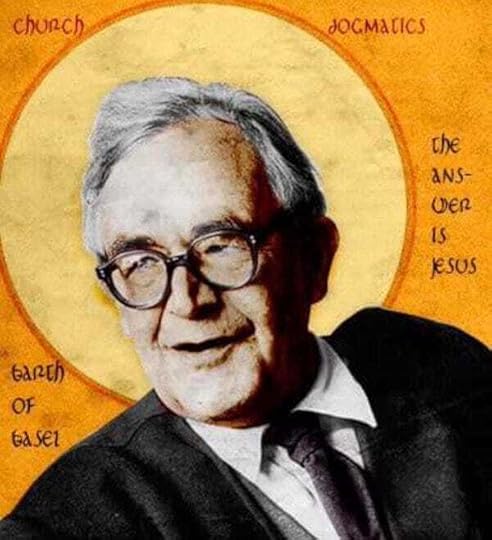
And then Barth quotes from the catechism, questions and answers worth posting here:
Q. 60: How are thou righteous before God?A.Only by a true faith in Jesus Christ; so that, though my conscience accuse me, that I have grossly transgressed all the commandments of God, and kept none of them, and am still inclined to all evil; notwithstanding, God, without any merit of mine, but only of mere grace, grants and imputes to me, the perfect satisfaction, righteousness and holiness of Christ; even so, as if I never had had, nor committed any sin: yea, as if I had fully accomplished all that obedience which Christ has accomplished for me; inasmuch as I embrace such benefit with a believing heart.
Q. 61: Why sayest thou, that thou art righteous by faith only?A.Not that I am acceptable to God, on account of the worthiness of my faith; but because only the satisfaction, righteousness, and holiness of Christ, is my righteousness before God; and that I cannot receive and apply the same to myself any other way than by faith only.
Q. 64: But does not this doctrine make men careless and profane?A.By no means: for it is impossible that those, who are implanted into Christ by a true faith, should not bring forth fruits of thankfulness.
 Get more from Jason Micheli in the Substack appAvailable for iOS and AndroidGet the app
Get more from Jason Micheli in the Substack appAvailable for iOS and AndroidGet the app
April 11, 2024
Is a Divine Jesus a Pretend Jew?

Tamed Cynic is a reader-supported publication. If you appreciate the work, pay it forward by becoming a paid subscriber!
After a hiatus due to my galavanting around the Scottish Highlands, Rabbi Joseph recently connected to discuss a recent article in the New Yorker by James Carrol.
You can find the piece here.
Show NotesSummary
The conversation between Jason and Rabbi Joseph Edelheit revolves around the article by James Carroll titled 'This Easter is Christianity Still Promulgating Anti-Semitism.' They discuss the portrayal of Jews in the Gospel narratives, the challenge of reading these texts in a way that is not anti-Semitic, and the historical development of anti-Jewish tropes. They also touch on the current political climate, the need for dialogue and community, and the importance of taking sides against hate and polarization.
Takeaways
The portrayal of Jews in the Gospel narratives has shaped how they are perceived across centuries.
Reading the passion story in the Gospel of John requires understanding the historical context and the history of John's own community.
Christianity has a responsibility to critically reflect on the anti-Jewish elements in scripture and to be careful in how these texts are interpreted and preached.
The rise of anti-Semitism is a global concern, and it is important to challenge and confront it.
Engaging in dialogue and building relationships across religious and ideological differences is crucial for healing and understanding.
Taking sides against hate and polarization is necessary for the preservation of democratic values and the pursuit of justice.
Sound Bites
"You can't use the term the Jews... without carrying from it all of those layers"
"Jesus the good teacher... inadvertently anti-Semitic or anti-Jewish"
"A divine Jesus would have been in essence a pretend Jew"
 Get more from Jason Micheli in the Substack appAvailable for iOS and AndroidGet the app
Get more from Jason Micheli in the Substack appAvailable for iOS and AndroidGet the app
April 10, 2024
Christians Do Not Sin
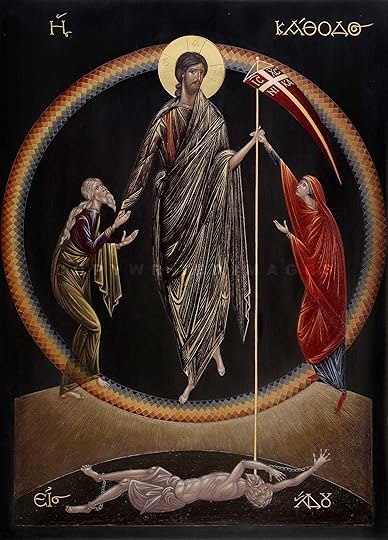
Tamed Cynic is a reader-supported publication. If you appreciate the work, pay it forward by becoming a paid subscriber!
Third Sunday of Eastertide — 1 John 3.1-7
In the appointed epistle for this coming Sunday of Easter, John insists straightforwardly that sin is lawlessness:
In what sense is sin lawlessness?“Everyone who commits sin is guilty of lawlessness; sin is lawlessness. You know that he was revealed to take away sins, and in him there is no sin. No one who abides in him sins; no one who sins has either seen him or known him.”
And on what basis can the apostle posit such an audacious and self-evidently false claim as the assertion that those who abide in Christ Jesus no longer sin?
The suggestion itself makes me want to curse John.
A good deal of the confusion surrounding this passage, I believe, owes to a lack of clarity about what constitutes sin in the scriptures. Having demoted the Son of God to a Good Teacher and reducing the gospel to moralism, we tend to understand sin in terms of behavior. As a seventeen year old convert to the faith, I was taught that sin is “missing the mark.” It was not until much later I realized how problematic it is that such a definition leaves God invisibly assumed. Self-justifying Christians define sin in other various modes as mistakes or failures, or as an illness that afflicts our fallen nature.
That we persist in redefining sin in so many ways is itself a feature of our sinfulness.April 9, 2024
The Resurrection is Not a Solution to the Problem of Death
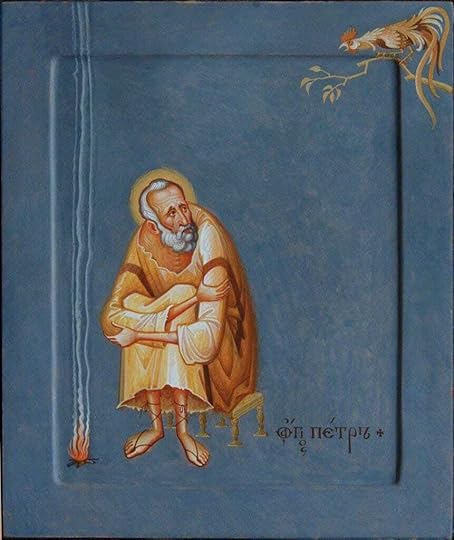
Tamed Cynic is a reader-supported publication. If you appreciate the work, pay it forward by becoming a paid subscriber!
Third Sunday of Eastertide — Acts 3.12-19
In Luke’s Acts of the Apostles, Peter and John have just healed a crippled panhandler begging at the entrance to Solomon’s portico at the temple in Jerusalem. Peter, fresh off his inaugural sermon, addresses the astounded onlookers, and this preached word follows the concise, pointed pattern of his preaching at Pentecost. “The God of Abraham…,” Peter proclaims, “glorified his servant Jesus, whom you delivered over and you denied in the presence of Pilate…you killed the Author of Life, whom God raised from the dead.” As in the case of his initial Spirit-led sermon, Peter’s gospel promise comes with a correlative command, “Repent therefore and turn back from your sins.”
Like so much of our vocabulary of faith, repentance (metanoia) has unraveled into a pejorative term with suffocating moralistic overtones.The term itself, however, refers not to our actions but to our attitudes, not to our bodies but to our minds.
As Robert Farrar Capon says, unpacking the dialectic between forgiveness and repentance:
Thus, to repent is to reorient wholly your perception of God.He forgave you before you repented. That’s crucial. See, that is why it is so outrageous. The gospel is really vulgar, crass and immoral because it says God forgives the world before it repents. In the gospel, repent is always repent and believe. It means turn yourself around from not trusting the forgiveness and trust it. That’s it. It doesn’t mean that you earn it by repenting. You had it before.
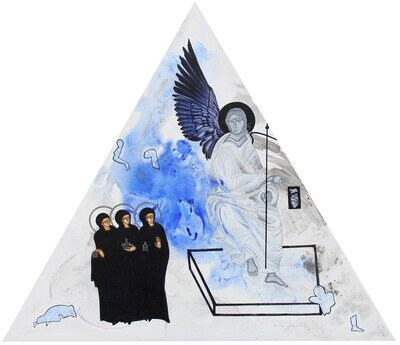
Of course, God’s history with his Israel attests rather unequivocally that the worship of the true God rather than the barren deities will produce a lived difference just as worship of the Not God both is sin and begets sins.
Peter’s gospeling in the Book of Acts is notable for the way in which the command to repent reliably follows the promise that Jesus lives with death behind him.So long as hearers understand repentance to refer chiefly to external behaviors, Peter’s preaching can sound as if the apostle is taking away with one hand the gift he’s given with the other hand. Having enlivened us with proclamation— it can sound to us— Peter lays upon us still more exhortation. He gifts us the gospel only to give us more law.
God’s done his part, raising Jesus from the dead.
Now it’s up to us— like Private Ryan— to do our part and earn it.
No.
Such an interpretation of Peter’s preaching fails to perceive Calvary as something other than the turning of the ages and does not posit the word of the cross as the sheer apocalyptic novum that the apostle Paul in particular proclaimed.
Straighten up and fly right is religion.
Get your act together is not revelation.
Rather, Peter’s sermons remind us in the season of Eastertide that the resurrection of Jesus Christ from the dead is neither merely an item in the history of Mary’s boy and Pilate’s victim nor is it a glad tiding of your future, “You will live with death behind you.” Dietrich Bonhoeffer makes this very point in Discipleship when he insists that the resurrection is not a solution to the problem of death.
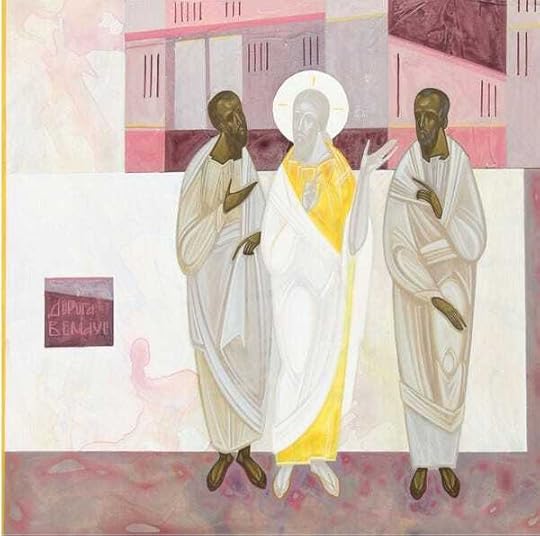
The resurrection is not a solution to the problem of death.
The resurrection is revelation.Easter is more than the vindication of the Son by his Father. Easter is the unveiling of the true God. The resurrection is God’s self-unveiling.
Peter’s Eastertide sermons are not merely recommendations for us of penitent, pious living.
They are reminders to us that the resurrection requires a wholesale reconfiguration of all our previously held convictions.
As the self-disclosure of the true God, the raising of Jesus is nothing less now than the criterion against which all our other beliefs must now be judged.April 8, 2024
An Odd Body Indeed

Tamed Cynic is a reader-supported publication. If you appreciate the work, pay it forward by becoming a paid subscriber!
The lectionary gospel passage for the Third Sunday of Eastertide is Luke 24.36b-48.
The text narrates the scene immediately following the Risen Jesus’s appearance to the two disciples on the road to Emmaus. No sooner does the breaking of the bread open their eyes to the presence of the formerly dead Jesus before them than the resurrection Christ “vanishes from their sight” (v.31).
An odd body.
Those two Emmaus-bound believers respond to the revelation by forsaking their itinerary to hasten and tell the apostles, “the Lord has risen indeed!” In the penultimate pericope of Luke’s Gospel, the apostles and the disciples are in the midst of puzzling out this news when, just as suddenly as he had vanished from their sight, “Jesus himself stood among them and said to them, "Peace be with you."
An odd body.
To prove to them that he is not a ghost, Jesus offers them the wounds in his hands and his feet. Seeing as he’s not an apparition, the disciples reciprocate by offering him hospitality. They give him some broiled fish to eat, which he does. Nevertheless, though the Risen Jesus not a ghost neither is as he was before he died, for when he lives them Jesus does not walk off into the distance. Presumably, he leaves in the manner in which he came— he vanishes.
An odd body indeed.
The Risen Jesus is both continuous with who he had been and somehow also surpassingly different.
In scripture’s longest— indeed the Bible’s only— meditation on the doctrine of the resurrection, the apostle Paul asserts with an inflexible alacrity, “Flesh and blood cannot inherit the Kingdom of God.”
Paul’s argument is so thoroughly resolute and bracingly clear it begs the question if any have ever read him given the manner in which, on the one hand, believers make bodily resurrection an essential of orthodoxy and, on the other hand, skeptics balk at the whimsy of the amino acids of Pilate’s victim rekindling into Mary’s boy. Paul, who was himself encountered by the Risen Jesus, is quite clear.
The news of Easter is not that the crucified corpse of Jesus came back alive. Therefore, the promise of Resurrection for us is not simply the hope that our dry bones will live again.Paul puts the mystery of resurrection in terms of the distinction between perishability and imperishability:
“And I say this, brothers: flesh and blood cannot inherit the Kingdom of God. Look, I tell you a mystery: Not all of us shall fall asleep, but all of us shall be changed, In an instant, in a glance of an eye, at the final trumpet; for the trumpet will sound, and the dead will be raised imperishable, and we shall be changed. For this perishable thing must clothe itself in imperishability, and this mortal thing must clothe itself in immortality. And, when this perishable thing shall clothe itself in imperishability and this mortal thing clothe itself in immortality, then will the saying that has been written come to pass: “Death has been swallowed up in victory.”
— 1 Corinthians 15.50-54
The contrast is between a soma psychikon (a body ensouled) and a soma pneumatikon (a body that is of a spirited nature, made to live entirely by pneuma, ie, deathless spirit). It’s a contrast, as the epistle makes clear, between an earthly origin and a heavenly one.
Resurrection is neither resuscitation nor reanimation of the material body one has in the fallen world. It is not, in fact, analogous to the raising of Lazarus or to Ezekiel’s valley of the dry bones. It is instead a radically different kind of life.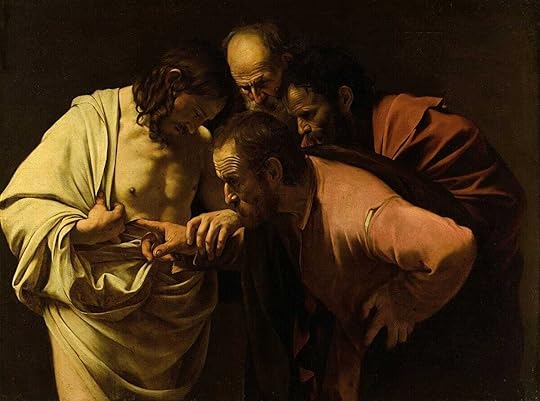
The resurrection body will be an altogether different kind of body. Christ’s resurrected body, therefore, is already an altogether different kind of body. Our bodies are not the prototype of a future model to come. The hope of the resurrection body is not like a the difference between an iPhone SE and an iPhone 14 ProMax, even maximally imagined.
Christ’s risen body is the first fruit of a new and future creatio ex nihilo.
We get the resurrection dogma wrong exactly to the degree we take our fallen soma psychikon as the definitional starting point.
Better then to ask a more fundamental question: What is a body?And of course our starting pointing must be Christ’s own words, “This is my body.”What is a body?
Simply, essentially— availability.
A person’s body is that person himself or herself insofar as he or she is available to others and also to himself or herself. If I disappeared, for example, I would no longer be accessible. I may be able to impact you still, but you would not be able to respond to me. There would no longer be any means for relationship.
It’s in this most basic sense of availability that scripture speaks of the body of the Risen Christ. The body of the Risen Christ is how the Lord Jesus makes himself available to us and makes us available to him and this body, scripture is clear, is the loaf and cup surrounded by his faithful.
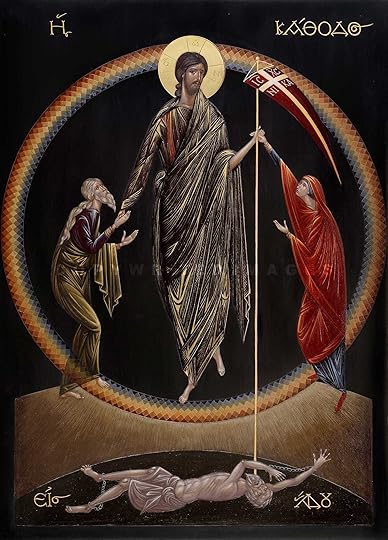 Whenever Paul, for example speaks of the “body of the Risen Christ” he’s speaking of the bread and the wine of the church’s eucharistic meal (1 Corinthians 10.16).
Whenever Paul, for example speaks of the “body of the Risen Christ” he’s speaking of the bread and the wine of the church’s eucharistic meal (1 Corinthians 10.16).This means of availability thus makes clear that Paul referring to the church as “the body of Christ” is no mere metaphor and it makes it clear why the sacrament of communion is both aptly named and justly at the heart of the church’s life. Indeed, in the same letter to the Corinthians, Paul stipulates the parallelism:
To “discern” the loaf and the cup on the table is to discern the church.
To discern the body of believers is to discern the bread and the wine.
And to discern either the body of believers or the loaf and the cup is to discern Christ personally present in his own body (1 Corinthians 11.17-29).
As Robert Jenson puts it,
"To say that Christ’s body is present as the bread and the cup is therefore to say that these indisputably available things, the bread and the cup, are his availability: that where they are present he not only has us before him but allows us to have him before us, not only touches us but allows us to touch him, not only sees us but allows us to see him. It is to say that as these things he gives himself to us as an object of our experience.”
The mutuality of this availability is critical as well. As Hegel noted, if someone were present to me as subject only and not also as my object in turn, I would just so be that person’s object only and not a subject over and against him or her. Such a personal presence, even if the person was Jesus, would enslave me.
Thus, the necessity of Easter, for a disembodied presence of Jesus to us today would not be enlivening or enlightening.It would be enslaving.For the crucified Jesus to live now by pneuma, by deathless spirit, as the first fruit of our own soma pneumatikon, means that he lives at once at the Father’s right hand but also he lives in between my fellow believer and me; he lives in loaf and cup on the table in the church and also he lives in the church for he is its head. All of these availabilities constitute his risen body. Such a definition of a resurrected body is a far cry from the formerly dead Lazarus stumbling out of his tomb and it’s a good deal more mysterious than me waking up from death to see my dearly departed again. But if “everlasting life” simply names the life of Father, Son, and Holy Spirit, any account of the resurrected bodies we await should be no less mysterious.
I told this story in a Christmas sermon a couple of years ago:
Back in Advent, after the Christmas Pageant, one of the children in the cast came up to me in the fellowship hall.
“I have a question,” she said.
“What’s your question?”
“So…Jesus is alive?”
I nodded. She thought about it for a moment. Clearly this hadn’t been her question.
“Well, if Jesus is alive, then how come we can’t see him?”
I knelt over and leaned in towards her and I whispered, like this was a secret too special to share.
“Actually,” I said, “you can see him; in fact, you did see him just last Sunday.”
“I did?”
I nodded.
“Yes, of course,” I said, “He was that bread on the table and the cup next to it. Jesus is alive and that’s the form— one of them, anyway— his body takes now.”
She nodded.
“Oh, cool,” she said.
And then she ran off as quickly as a magi from the manger.
 Get more from Jason Micheli in the Substack appAvailable for iOS and AndroidGet the app
Get more from Jason Micheli in the Substack appAvailable for iOS and AndroidGet the app
April 5, 2024
The Power of Words
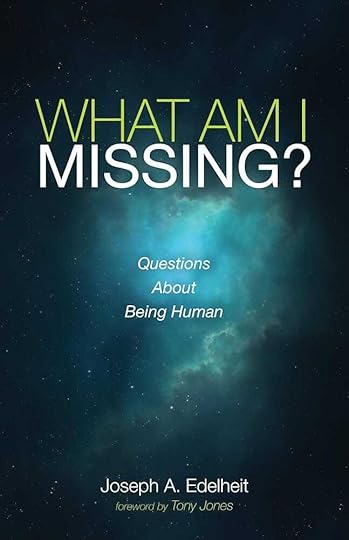
Tamed Cynic is a reader-supported publication. If you appreciate the work, pay it forward by becoming a paid subscriber!
Summary
In this conversation, Rabbi Joseph and the team the discuss the importance of interpersonal relationships and the power of words. They explore the concept of enoughness and the transformative potential of embracing uncertainty and complexity. They also touch on the dangers of simplification and the need for community and pluralism. The conversation concludes with a reflection on the identity of Christians and Jews and the journey to discovering one's true self. In this conversation, the speakers discuss various themes related to identity, character, the internet, questions, discourse, Holy Week, Jesus as a Jew, serving, the delay of God's promises, the violence of Holy Week, the universal God, pluralism, and the depth of spirituality.
Takeaways
We learn the most important aspects of ourselves from our engagement with others.
Embracing uncertainty and complexity can lead to personal growth and transformation.
Community and pluralism are essential for our survival and well-being.
Understanding the concept of enough and embracing it can lead to liberation and contentment. Identity is not achieved, but given.
Character is shaped by external events and the world's perception of us.
The internet can both connect us and make us complain about minor inconveniences.
Asking questions is a valuable and necessary part of faith and growth.
Discourse and dialogue are essential for understanding and discernment.
Holy Week is a time of reflection on the suffering and sacrifice of Jesus.
Jesus' Jewish identity is important for Christians to recognize and appreciate.
Serving others is a way to follow in the footsteps of Jesus.
God's promises are inviolable, and there is a delay in their fulfillment.
The violence of Holy Week highlights the depth of Jesus' sacrifice.
God's love is universal and inclusive of all people.
Pluralism allows for different expressions of spirituality and faith.
The depth of spirituality is not measured by religious labels or institutions.
Holy Week can be a challenging and emotionally intense time for believers.
 Get more from Jason Micheli in the Substack appAvailable for iOS and AndroidGet the app
Get more from Jason Micheli in the Substack appAvailable for iOS and AndroidGet the app
Jason Micheli's Blog
- Jason Micheli's profile
- 13 followers



